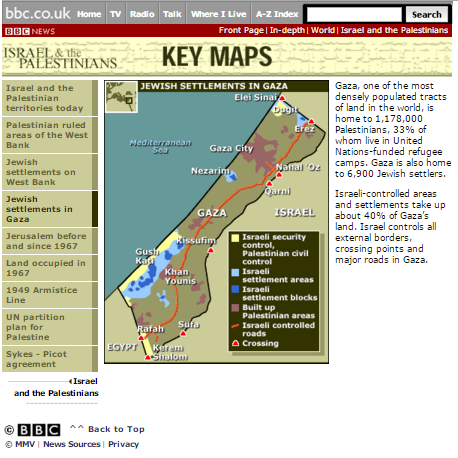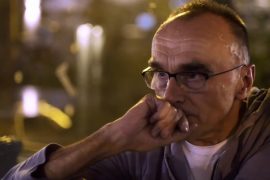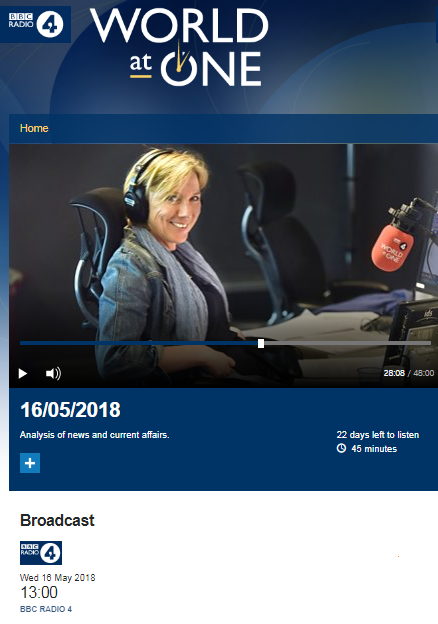October 28th saw the appearance of an article by Yolande Knell in the ‘Features’ section of the BBC News website’s Middle East page. Titled “Palestinians face uncertainties over Abbas succession“, the report was translated into Arabic and also appeared two days later on the BBC Arabic website.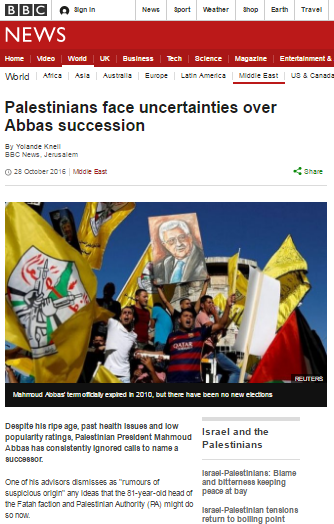
Knell’s staid portrayal of the issue of who will succeed Mahmoud Abbas in his role as president of the Palestinian Authority (as well as chair of the PLO and head of the Fatah party) is most notable for what is absent from her framing of the story. Given that BBC audiences suffer from a chronic lack of information concerning internal Palestinian affairs, it is of course highly unlikely that they would be able to read between Knell’s lines and fill in the blanks for themselves.
For example, readers are told that:
“Three other potentially important players have strong backing in the security forces:
- Mohammed Dahlan, led the PA’s Preventive Security force in Gaza until 2007. He was expelled from Fatah after falling out with the president and now lives in luxurious exile in Abu Dhabi. He also has close ties to regional leaders”
Knell refrains from telling audiences that in recent months Abbas has been urged by some of those “regional leaders” to mend fences with Dahlan – as the Times of Israel explained back in August.
“Arab leaders have recently been pressuring the Palestinian Authority and its leader Mahmoud Abbas to patch up differences within Fatah and make peace with former Gaza strongman Mohammad Dahlan.
Among the heads of state who have weighed in are Egyptian President Abdel-Fattah el-Sissi, Jordan’s King Abdullah, King Salman of Saudi Arabia, and United Arab Emirates President Khalifa bin Zayed Al Nahyan. […]
In response, Fatah’s Central Committee has resolved to consider readmitting to its ranks several dozen senior Fatah figures expelled for their links to Dahlan. But they have not yet agreed to readmit Dahlan himself, who was kicked out of the Gaza Strip in 2011 after a feud with Abbas.
Indeed, despite Arabic media reports about possible reconciliation within the Fatah movement, senior figures within the Palestinian Authority (PA) say there is still quite some way to go.”
Abbas himself voiced public objection to what he saw as intervention from “other capitals” on that issue – although Dahlan himself is on record as denying a wish to run for the PA presidency (despite Knell’s later claim that he and others “undoubtedly regard themselves as possible future presidents”).
Relatedly, in the days before (and since) Knell’s article was published severe violence was seen in a number of locations in PA controlled areas.
“Intense clashes erupted in three refugee camps Tuesday night between Palestinian youths and Palestinian Authority security forces, after a protest over the recent expulsion from the Fatah party of a Palestinian lawmaker was suppressed.
At least two people were wounded from reported live fire during the clashes, which took place in the refugee camps of al-Amari, near Ramallah, Balata, near Nablus, and Jenin.
The clashes began when PA security refused to allow a protest in support of Jihad Tummaleh, who was expelled from the Fatah party on Saturday by PA President Mahmoud Abbas, near Tummaleh’s home in the al-Amari refugee camp.
Tummaleh’s expulsion came after he organized a conference at al-Amari in support of “party unity.” The event was viewed by some in Ramallah as an effort to urge reconciliation between Abbas and his chief political rival Mohammad Dahlan. […]
PA security forces also arrested Tuesday night the official spokesperson of Fatah in Jerusalem, Rafat Alayan, who had earlier participated in a rally in support of Tummaleh.”
Also unmentioned by Knell is the meeting which took place between Abbas and Hamas leaders in Qatar the day before her report was published.
“The 81-year-old Abbas met with Hamas politburo chief Khaled Mashaal and Hamas’s Gaza leader, Ismail Haniyeh, for a “business lunch” in Doha, the PA’s official news agency Wafa said. […]
The meeting in Doha was attended by the Foreign Minister of Qatar Mohammed bin Abdulrahman bin Jassim Al-Thani, PLO Secretary General Saeb Erekat and Palestinian Ambassador to Qatar Munir Ghanam.”
Veteran analyst Avi Issacharoff interprets that meeting as follows:
“In a turn of events no one could have foreseen mere weeks ago, Palestinian Authority President Mahmoud Abbas — until recently the ally of Egypt and Saudi in the fight against the Muslim Brotherhood and other radical Islamist groups — met on Wednesday with Khaled Mashaal, outgoing head of Hamas’s politburo, and with Ismail Haniyeh, Mashaal’s successor. These meetings took place after Abbas met the previous week with Turkish President Recep Tayyip Erdogan and Qatari Emir Sheikh Tamim bin Hamad al Thani.
Erdogan and Sheikh Tamim are considered strong patrons of the Muslim Brotherhood, the great rival of Egypt and its president, Abdel Fattah el-Sissi. Abbas’s meetings with them, as well as his talks with Mashaal and Haniyeh, the two highest-ranking members of Hamas (the Muslim Brotherhood’s Palestinian offshoot), may even lead to a historic reconciliation with Hamas, though that outcome is still a long way off. Whether such a reconciliation would be a good or a bad thing depends on whom you ask.
So what — or, rather, who — has led Abbas straight into the arms of the Muslim Brotherhood, and maybe even into those of Hamas, just days after a high-ranking Hamas official in Gaza called him a traitor?
The answer is simple: Mohammad Dahlan. This former high-ranking Fatah official, who has been challenging Abbas for several years, succeeded this week in areas where even Hamas has failed. He managed to get Cairo on his side in the fight against Abbas and proved how weak and shaky Abbas’s status is in the Arab world.”
As Issacharoff also points out, another succession struggle is also underway:
“…everybody is busy with the question of “the day after.” Many members of Fatah fear that the day is fast approaching when Fatah will split over the uncompromising battle between Dahlan and Abbas, and Hamas will become more powerful still.
It should be emphasized that Dahlan is not the only one in Fatah to be marking out territory in anticipation of the fight over the succession.
The highest levels of Fatah, as a whole, are busy with Fatah’s general assembly, which is set to take place in late November and can point the way to who Abbas’s successor might be. Fatah’s Central Council will be elected during the assembly — and according to Fatah’s bylaws, it is only from the Central Council that Abbas’s successor, Fatah’s next chairman, may be chosen. It is also likely that the assembly will elect Fatah’s deputy chairman, who could, in time, succeed to the chairmanship.”
All that internal Palestinian conflict is obscured by Knell. She does however find it necessary to promote ‘analysis’ from a Belgium-based NGO.
“…there is no clear frontrunner and analysts warn against second-guessing the dynamics within Fatah.
“The names you hear about most often are basically former security people because these are whom Israel is most comfortable with and whom Western donors have interacted with and vetted,” says Nathan Thrall of International Crisis Group.
“These sometimes correlate with what’s realistic in Fatah power structures but oftentimes not.””
So is Yolande Knell unaware of the back story to the issue she supposedly set out to explain to BBC audiences? A vaguely worded caption to one of the images used to illustrate the article suggests not.
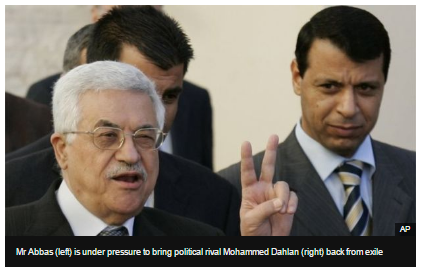
The question that therefore arises is why the BBC’s funding public and worldwide audiences are not being told the whole story.

